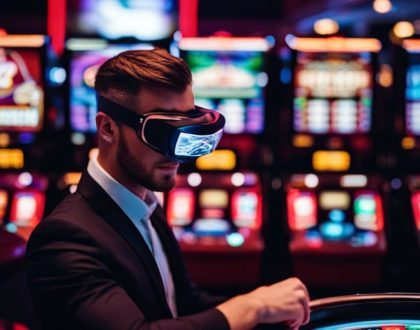The Power of Play – Gamification’s Role in iGaming

Most online casinos and gaming platforms have recognized the power of play in engaging their players and keeping them coming back for more. By incorporating elements of gamification into their platforms, these sites are able to create more immersive and interactive experiences for their users.
From leveling up and unlocking rewards to participating in tournaments and challenges, gamification in iGaming has the ability to enhance the overall player experience and increase player retention. However, it is important for operators to strike a balance between engagement and responsible gaming to ensure that players are enjoying themselves in a safe and responsible manner.
The Psychology Behind Gamification
Behavioral Motivation
Gamification leverages principles from behavioral psychology to motivate players. By incorporating elements like points, levels, and badges, games tap into our intrinsic desires for achievement and progression. These mechanics fundamentally alter the way players engage with the gameplay, creating a sense of accomplishment and driving them to continue participating. In iGaming, this can translate to increased user engagement and longer play sessions.
Reward Systems and Feedback Loops
Psychology plays a crucial role in designing effective reward systems and feedback loops in gamification. The use of variable ratio reinforcement schedules, where rewards are given at unpredictable times, can trigger a powerful response in players. This uncertainty keeps players coming back for more, as they never know when they might hit the jackpot. Additionally, immediate feedback on their actions allows players to learn and improve, keeping them actively involved in the game.
Motivation is key in gamification, and understanding how to effectively leverage psychological principles can make a significant impact. By implementing well-designed reward systems and feedback loops, iGaming platforms can drive player engagement and loyalty, ultimately leading to a more successful and profitable operation.
Gamification Elements in iGaming
Points and Scoring Mechanisms
Little can rival the excitement of earning points and achieving high scores in iGaming. Points and scoring mechanisms are fundamental gamification elements that drive player engagement. These elements create a sense of progression, challenge players to improve their skills, and provide immediate feedback on their performance.
Leaderboards and Ranking
An imperative feature in gamified iGaming experiences is the incorporation of leaderboards and player ranking systems. These elements add a competitive edge to gameplay, fueling players’ desire to outperform others and climb the rankings. To create a dynamic gaming environment, leaderboards often display real-time updates on players’ positions and showcase the top performers.
To increase competitiveness and foster player interaction, leaderboards can also include social sharing functionalities. Players can challenge their friends, compare their rankings, and celebrate their achievements together, enhancing the social aspect of the gaming experience.
Badges, Achievements, and Trophies
Gamification in iGaming is further enriched by the inclusion of badges, achievements, and trophies. These virtual rewards acknowledge players’ accomplishments, encourage them to explore different aspects of the game, and provide a sense of accomplishment. Players strive to unlock all badges, collect achievements, and showcase their trophies as symbols of mastery and dedication.
Achievements, in particular, offer players a roadmap of challenges and goals to pursue within the game. By completing specific tasks or reaching significant milestones, players unlock achievements that showcase their progress and expertise, adding another layer of depth and motivation to the gaming experience.
iGaming platforms leverage gamification elements to enhance player engagement, retention, and enjoyment. By integrating points and scoring mechanisms, leaderboards, and badges, achievements, and trophies, iGaming operators create immersive and rewarding experiences that captivate players and keep them coming back for more.
Enhancing User Engagement
Challenges and Competitions
Many online gambling platforms utilize challenges and competitions to enhance user engagement. These elements add an exciting dimension to the gaming experience, motivating users to stay active and involved. Competitions stimulate users’ competitive nature, driving them to improve their skills and performance in order to win rewards or recognition.
Storytelling and Thematic Layers
Many iGaming platforms incorporate storytelling and thematic layers to immerse users in a compelling narrative. An engaging story can captivate users’ attention, making them feel more connected to the game world and invested in the outcome. By weaving thematic layers into the gameplay, developers create a more enriching and memorable experience for users.
Competitions in iGaming not only increase user engagement but also foster a sense of community among players. By competing against each other, users develop social connections and form a deeper bond with the platform. This sense of camaraderie can keep users coming back for more, leading to increased retention rates and prolonged user involvement.
User Experience (UX) Design in iGaming
Interface and Interaction Design
For user experience (UX) design in iGaming, interface and interaction design play a crucial role in engaging players. The interface should be intuitive and visually appealing, allowing players to navigate seamlessly through the game. Interaction design focuses on the way players interact with the game, including controls, feedback, and animations. A well-designed interface enhances the overall gaming experience and keeps players coming back for more.
Personalization and Player Journeys
For user personalization and player journeys, iGaming platforms are leveraging data and analytics to tailor experiences for individual players. Personalization involves customizing gameplay based on player preferences, behavior, and demographics. Player journeys map out the different stages a player goes through while engaging with the game, from onboarding to retention. By understanding player behavior and providing personalized experiences, iGaming platforms can increase player engagement and loyalty.
Experience in iGaming, personalization and player journeys are not only about providing a unique experience for each player but also about creating a sense of progression and accomplishment. By offering tailored rewards, challenges, and content based on player actions and preferences, iGaming platforms can enhance player satisfaction and retention. A well-crafted personalization strategy can lead to higher player engagement and ultimately drive long-term success for iGaming operators.
Monetization Strategies
In-Game Purchases
All successful iGaming platforms incorporate in-game purchases as part of their monetization strategy. These purchases can include various virtual goods such as power-ups, cosmetics, or additional game content that enhance the player’s experience. One key aspect of in-game purchases is making them appealing yet not vital for gameplay, striking a delicate balance to ensure players are willing to spend without feeling forced to do so.
Loyalty Programs and VIP Clubs
Strategies that focus on building player loyalty through loyalty programs and VIP clubs are vital for long-term success in the iGaming industry. By rewarding players for their engagement and spending, platforms can keep them coming back for more. VIP clubs offer exclusive perks and privileges that incentivize high-spending players to remain loyal and continue investing in the platform.
Monetization strategies that incorporate loyalty programs and VIP clubs can significantly impact the revenue generated by an iGaming platform. By fostering a sense of belonging and providing special rewards, platforms can increase player retention and ultimately drive profits.
Technology and Innovations
Despite the challenges faced by the iGaming industry, technology continues to drive innovation and shape the future of online gaming. With constant advancements in mobile technology, augmented reality, and virtual reality, the gaming experience has been elevated to new heights.
Mobile Gaming and App Integration
Technology has revolutionized the way we access and enjoy online games. Mobile gaming has witnessed phenomenal growth thanks to the widespread adoption of smartphones and tablets. iGaming operators have capitalized on this trend by developing dedicated apps that offer a seamless gaming experience on the go. This integration has enabled players to access their favorite games anytime, anywhere, enhancing convenience and engagement.
Augmented Reality (AR) and Virtual Reality (VR)
Gaming enthusiasts are eagerly embracing the possibilities presented by augmented reality and virtual reality technologies. AR and VR have the potential to transport players to immersive virtual worlds, making the gaming experience more realistic and interactive. From virtual casinos to AR-enhanced gameplay, these technologies are reshaping the future of iGaming.
Plus, augmented reality and virtual reality technologies pave the way for innovative gameplay features and unparalleled user experiences. The incorporation of AR and VR in iGaming not only enhances the entertainment value but also opens up new avenues for personalization and player interaction.
Ethical Considerations and Responsible Gaming
Once again, it is crucial to address ethical considerations and responsible gaming practices within the iGaming industry. As the popularity of online gaming continues to rise, it is important for operators to prioritize the well-being of their players and ensure a safe and enjoyable gaming environment.
Preventing Gaming Addiction
Preventing gaming addiction is a top priority for operators in the iGaming industry. Implementing strict policies and tools such as self-exclusion options, reality checks, and deposit limits can help players manage their gaming behavior. Additionally, providing resources for players to seek help for addiction issues is crucial in promoting responsible gaming.
Regulatory Compliance and Fair Play
Fair play and regulatory compliance are important aspects of ethical iGaming operations. Operators must adhere to strict regulations set forth by gaming authorities to ensure transparency and fairness in games. Regular audits and testing of gaming software and RNGs help maintain integrity and trust within the gaming community.
Gaming authorities such as the UK Gambling Commission and the Malta Gaming Authority enforce stringent guidelines to protect players and promote responsible gaming practices. Compliance with these regulations not only ensures a level playing field for all participants but also fosters a safe and trustworthy gaming environment for players.
Summing up
From above, it is clear that the power of play, harnessed through gamification, plays a crucial role in the iGaming industry. By incorporating game elements into traditional gambling activities, operators can enhance engagement, retention, and overall user experience. The use of leaderboards, challenges, rewards, and social interactions not only increases player participation but also promotes a sense of accomplishment and enjoyment, ultimately leading to higher player satisfaction and loyalty.
Gamification has the potential to revolutionize the way iGaming operates, offering a unique, interactive, and entertaining experience for players. By understanding the psychology of gaming and applying it strategically, iGaming operators can create a more immersive and personalized environment that caters to the evolving preferences of modern players. Embracing gamification as a powerful tool within the industry can drive innovation, growth, and success in the increasingly competitive iGaming market.
Recommended Posts

The World of Wearable iGaming Tech
May 17, 2024

Going Live – Surge of Live Stream Gambling
May 17, 2024

Malta’s iGaming Frontier – Best Brands
May 17, 2024




